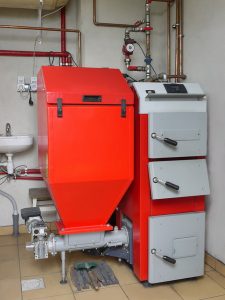As the trusted HVAC experts in your community, we understand the pivotal role that a reliable boiler plays in ensuring your home stays warm and comfortable. With the winter season drawing to a close, it’s an opportune time to assess the condition of your boiler and ponder a critical question: Is this the year you replace it? Or is it better to continue with boiler repair in Brighton, MI?
Signs of an Aging Boiler
- Inefficient Heating: As boilers age, they may struggle to maintain the desired indoor temperature efficiently. If you’ve noticed uneven heating or certain rooms consistently colder than others, it could be a sign that your boiler is no longer performing at its best.
- Strange Noises: Unusual sounds emanating from your boiler, such as banging, clanking, or whistling, should not be ignored. These noises often indicate underlying issues, possibly resulting from worn-out components or sediment buildup within the system.
- Increased Energy Bills: Aging boilers tend to operate less efficiently, leading to a spike in energy consumption. If your utility bills have been steadily climbing, your boiler could be the culprit. Upgrading to a more energy-efficient model can yield significant long-term cost savings.
- Frequent Repairs: Continuous repairs can become a drain on your finances and may signal that your boiler is reaching the end of its lifespan. Rather than investing in temporary fixes, it might be more economical to consider a replacement that offers a more sustainable solution.
Assessing Your Boiler’s Age
- Establishing Installation Date: Determine the age of your boiler by locating its installation date. This information is typically found in the user manual or on the unit itself. Knowing the age of your boiler is crucial in making informed decisions about its future.
- Comparing Lifespan Expectancy: Different types of boilers have varying lifespans. On average, traditional boilers last around 15 years, while newer, high-efficiency models can endure for up to 20 years. Consider the type of boiler you have and its expected lifespan when evaluating its condition.
- Considering Technological Advances: Advances in boiler technology have made newer models more efficient and reliable. If your boiler is approaching the end of its lifespan, it might be worth exploring the benefits of upgrading to a modern system with enhanced features.
Post-Winter Evaluation
- Recap Winter Performance: Reflect on your boiler’s performance throughout the winter. Did it struggle to keep up with heating demands? Were there any noticeable issues? Understanding how your boiler fared during the coldest months provides valuable insights into its overall health.
- Arranging for a Professional Inspection: Schedule a post-winter inspection with our HVAC professionals. Our experts will thoroughly assess your boiler, identifying any wear and tear, potential issues, or safety concerns. This proactive approach ensures you address problems before they escalate.
- Analyzing Repair Costs vs. Replacement Costs: Evaluate the financial implications of continuing repairs versus investing in a new boiler. While repairs may offer a temporary solution, frequent fixes can accumulate, making a replacement a more cost-effective and sustainable choice in the long run.
Work With Our Expert Team
If you’re contemplating a boiler replacement or seeking professional advice, contact us today. Our team is ready to assist you in making the best decision for your home heating needs. Schedule your consultation now for a more efficient and reliable heating system.
First Choice Heating & Cooling serves Fenton and the surrounding areas. If your home had a voice … it would call First Choice!

